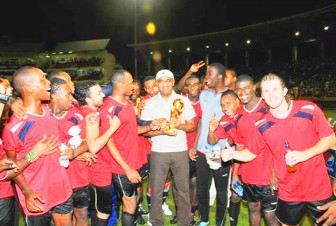Football of yesteryear flourished in the urban working-class communities that border Georgetown to the east and to the south. The best teams, the most attractive players have emerged mostly from those communities……… Albouystown, Charlestown, Ruimveldt, Lodge and Campbelville being the communities that produced many of the best footballers. It was in these communities that some of the really enterprising clubs were built. Linden too has produced its own fair share of talented footballers; again, the talent came from among the working-class young men of the community.
The young men who took to football were, for the most part, pursuing options to idleness and wasted youth. They brought with them their youthful exuberance, their skills and their showmanship. They brought too their working-class coarseness, their poverty and their search for opportunities to rise above where they came from.
The game has not reciprocated their enthusiasm with anything remotely resembling a generous payback. A few shone briefly and might have even harboured dreams of materially rewarding careers. At the end of the day, however, they had to surrender the passion and the dreams of their youth to the responsibilities of adulthood and the realization that the game could not give them what they had to have.

Here, there are many sad stories. Some of the young men had no viable options; so that football of yesteryear has bred quite a few bitter, angry men, ex-players whom, if you get close enough to them, will share with you their ‘glory-glory’ days, their albums filled with faded pictures of their past; and after you have seen and heard enough of what once was, they will tell you about descent into doldrums, brooding over the betrayal of their dreams.
But it is not football that has let them down. Guyana may have spoken repeatedly of sport as a “nation builder,” but that is only one of a thousand slogans, political sound-bite which, at the end of the day has been that and nothing more. Sport in Guyana has stood still, marked time. It is the same with football as it is with every other sport. We have done no more than immerse ourselves in a river of self-delusion.
There is simply no excuse for the official neglect of sport. Less than five years shy of half a century of independence there is still no infrastructure, no plan, no vehicle with which to take sport forward.
The underdevelopment has reflected itself in our woeful underachievement on the global stage even as countries right here in the region have demonstrated that more could be done even with the limited resources that we have. Football is a hapless victim of the broader national indifference to the relevance of sport.
Beyond official neglect the game has become afflicted by a perverseness that passes for management. The clubs and the players and the football itself have become muddled in inept bureaucracies, the management of the game having opened up avenues for opportunism, aggrandizement, the building of obscene power bases and the flowering of corruption. The game has been left gutted. The Guyana Football Federation (GFF) epitomizes the continual descent into nothingness. In several respects it has come to resemble international football’s parent body FIFA, thriving on cronyism. Persistent rumours of corruption are not believed to be exaggerated. If you were to ask the local Federation to itemize the accomplishments of the game in terms of creating a permanent organizational infrastructure, physical facilities or systems for nurturing talent at the various levels, it would have little if anything to show. What it has lacked is an overarching vision as to where it wants to take the game and an underpinning plan to serve as a vehicle for the journey. If the truth be told football appears to have been set upon by all and sundry, people who appear, for the most part, to have no clue about how to build structures and motivate people. There are players, clubs, tournaments and the Golden Jaguars but there has been no real growth. Growing football is a challenge that appears to be beyond the capacity of those who run the game. The GFF’s failure reposes in its absurd determination to control the game rather than to take it forward. It postures behind its FIFA affiliation and its thicket of rules that are instruments of control rather than tools for development. Those instruments of control mean absolutely nothing since, in the final analysis neither the Federation nor its rules have been able to take the game forward in the manner that the game has gone forward in other territories right here in the Caribbean. What the GFF has done is to cling to the notion of its own authority though such authority as it thinks it has is a mere chimaera for the simple reason that it has accomplished little if anything for football. Put differently, its authority has been squandered.
The fact that the Federation has had to endure a protracted period of one-man rule has been a real problem. Where power is vested in a sole source for lengthy periods, the holder of power inevitably comes to be preoccupied with tenure. That has its own terrible consequences since the things that are important tend to get subsumed beneath the preoccupation with entrenchment. People, however much they insist to the contrary, are invariably reluctant to step away from power and sometimes, too many times, the methods that they must use to ensure their own survival eventually end up destabilizing the institution as a whole. The power-seekers build clusters of enemies who are aware of their power and who, as a consequence cultivate the art of patronizing and destabilizing, simultaneously. Plots to depose are hatched. For the incumbent survival becomes an end in itself.
That has been the case with the GFF. When you look over your shoulder, however, you see that those brandishing the long knives have no more noble motives.

There are patently obvious reasons why those who rule the game choose football for their selfish adventurism. The young men who want to play football only want to play; they need to be led; and leadership can be a wild card. In the case of football, leadership has had its origins into cynicism and in the exploitation of vulnerability. Patronage and cronyism are the tools that have been used to fashion power bases within the game. By importing controlling influences from outside the game football has fashioned its own misfortune. But then, perhaps, football may have had little choice.
On the other hand, the GFF could not expect to survive in its present condition, ad infinitum. It had become too arrogant, too self-centred; and now it has been flushed from its lair not by its domestic detractors but by FIFA itself and it is now up to those who love the game and who have worked for change to ensure that the current interregnum of uncertainty is not supplanted by the status quo ante. Too much time has already been lost; too many dreams shattered. A far more worthwhile, more enlightened, more competent leadership must emerge. Football has waited far too long for change and the game deserves change.
Arnon Adams









